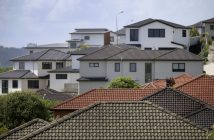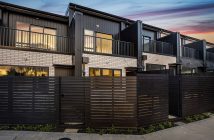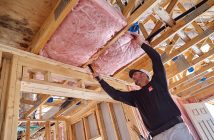The median house price for New Zealand rose 6.9% in February to $530,000 up from $496,000 in February 2017 according to the latest data from the Real Estate Institute of New Zealand (REINZ)

The median house price for New Zealand excluding Auckland rose even higher, seeing an 8.4% increase to $450,000 from the same time last year.
Prices in Auckland increased at a more moderate 3.7% to $858,000 from the same time last year (up from $827,000) and were up 4.6% month-on-month.
The Hawke’s Bay saw a price increase of 18.4% to a record high of $444,000 up from $375,000 in February 2017 or up 3.3% from January 2018.
Bindi Norwell, Chief Executive at REINZ says: “Median house prices increased in 14 out of 16 regions across New Zealand during February 2018 compared to February 2017, including a record high in the Hawke’s Bay.
“The only regions not to experience an increase were the West Coast and Gisborne, which saw decreases of 10.7% and 3.1% respectively.’
The Hawke’s Bay has seen record price increases for two months in a row now, with prices having increased $26,000 since the end of 2017, Norwell notes.
“Clearly the region is proving extremely popular,” she says.
“Additionally, the recent announcement by the Regional Economic Development Minister, Shane Jones, that nearly $9 million will be spent to reopen the Wairoa-Napier line for logging trains will bring significant development for the Hawke’s Bay region.
“Auckland’s median price, while continuing to slowly creep upwards, is clearly showing signs of moderated growth rather than the double digits we saw throughout 2016 and 2017.
“This is far more positive for the region as we know double-digit increases are not sustainable in the long term,” continues Norwell.
Positive volumes
Volumes continued to show positive momentum in February with the number of properties sold across New Zealand increasing by 1.2% year-on-year to 6,373 properties.
The number of properties sold in Auckland during February increased by 2.0% to 1,600 (up from 1,568 in February 2017).
Regions with the biggest increase in sales count year-on-year were:
- West Coast – up 50.0% (45 sales compared to 30 in February 2017) – the highest number of properties sold since May 2012
- Nelson – up 25.8% (117 sales compared to 93 in February 2017) – the highest number of properties sold since March 2007
- Southland – up 9.7% (170 sales compared to 155 in February 2017).
“In February 9 out of 16 regions saw an increase in the number of properties sold, pointing to strong regional growth in the majority of the country,” Norwell maintains.
“Nelson saw the highest number of properties sold in nearly 11 years and the West Coast saw the highest number of properties sold in just under 6 years – so there have been some really strong localised results.”
“From a national perspective, we’ve seen the number of properties sold year-on-year increase for two months in a row now. It’s not quite enough data to call a trend, but with nearly 300 more houses sold for the year-to-date when compared to 2017, it’s certainly a positive sign for the industry,” Norwell believes.
REINZ House Price Index (HPI)
The REINZ House Price Index for New Zealand, which measures the changing value of property in the market, increased 3.9% year-on-year to 2,692 – a new record high.
The HPI for New Zealand excluding Auckland increased 6.9% from February 2017 to a new high of 2,524 and Auckland’s HPI increased 1.1% for the same period.
The REINZ HPI showed that 11 out of 12 regions experienced an increase in their HPI and 9 regions saw a new high in February, highlighting the strength of the property market.
Regions with the highest growth year-on-year were Gisborne/Hawke’s Bay +16.0%, Southland +12.3%, Northland +10.4% and Manawatu/Wanganui +10.2%.
Days to sell
The median number of days to sell a property nationally increased by 4 days from 40 days in February 2017 to 44 days in February 2018.
Auckland saw the median days to sell a property increase by 6 days to 49 (up from 43 in February 2017). This is the highest number of days it’s taken to sell a property in Auckland for 9 years.
Regions with the biggest increase were West Coast (+21 days to 105), Marlborough (+12 days to 49), Manawatu/Wanganui (+8 days to 40), Canterbury (+7 days to 50 – the highest number of days it’s taken to sell a property since March 2011) and Otago (+7 days to 42).
Three regions saw a decrease in the number of days to sell year-on-year; Gisborne (-11 to 46 days), Hawke’s Bay (-5 days to 29 – the only region with figures still in the 20s) and Southland (-3 days to 36).
Auctions
Auctions were used in 12% of all sales across the country in February, with 756 properties selling under the hammer. This is down slightly from February 2017, when 15% of properties were sold via auction.
Gisborne saw the highest percentage of auctions across the country with 40% of properties in the region sold under the hammer, followed by Auckland on 22% and the Bay of Plenty on 18%.
By contrast, the West Coast and Tasman saw no auctions take place in February and the Manawatu/Wanganui only saw 1% of properties sold by auction.
In Auckland, 356 properties were sold by auction last month compared to 462 properties in February 2017.
Inventory
The number of properties available for sale nationally increased by 3.2% (from 26,110 to 26,943) compared to 12 months ago.
This figure is buoyed by reasonably large inventory increases in Waikato (+15.0% – an additional 252 properties), Auckland (+10.9% – an additional 943 properties) and Canterbury (+10.7% – an additional 387 properties).
A decrease in inventory in 10 regions saw the New Zealand excluding Auckland level of inventory fall by 0.6% from 17,465 in February 2017 to 17,355 in February 2018.
Regions with the biggest falls in inventory were:
- Hawke’s Bay – down 16.4%
- Gisborne – down 12.6%
- West Coast – down 12.9%
- Taranaki – down 12.4%
- Southland – down 10.8%.
The Hawke’s Bay region only has 7 weeks’ inventory available to those looking to purchase in the area – the lowest level of inventory in 10 months.
Price bands
Between February 2017 and February 2018, the number of homes sold for less than $500,000 across New Zealand fell from 50.2% of the market (3,163 properties) to 46.0% of the market (2,930 properties) which is reflected by the overall increasing median price.
However, at the upper end of the market, the percentage of $1 million plus properties sold increased from 11.4% of the market to 13% of the market.
“Taking time to analyse the price bands on a regional basis helps to understand why Gisborne was one of the only regions to experience a decrease in median price during February,” Norwell says.
The number of properties sold in the $500,000 to $750,000 bracket was only 3.8% in February 2018, compared to 11.1% in February 2017.
“Additionally, the number of properties in the $250,000 to $499,999 bracket increased from 50.8% to 62.3% – thereby decreasing the overall median price for the region,” Norwell concludes.



